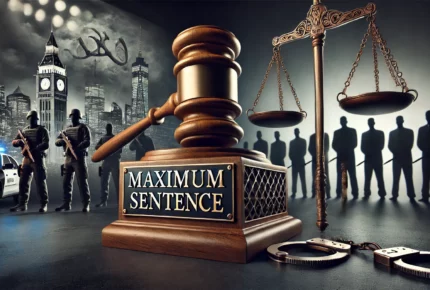

Being accused of bribery or corruption is an extremely serious matter that can leave you feeling overwhelmed and uncertain about what lies ahead. Whether you are facing allegations in a business context, public sector environment, or any other setting, the implications for your personal and professional life can be profound. This article will help you understand the offences of bribery and corruption, the range of sentences available to the courts, how suspended sentences function, and what practical measures you can take to protect your interests.
What is bribery and corruption?
Bribery involves offering, promising, giving, requesting, agreeing to receive, or accepting an advantage as an inducement or reward for performing a function or activity improperly. Corruption is a broader term encompassing various forms of dishonest or fraudulent conduct by those in power, typically involving bribery but also including abuse of office and other misconduct.
In England and Wales, bribery offences are primarily governed by the Bribery Act 2010, which came into force to strengthen and simplify anti-corruption laws. The Act creates several offences:
- offering a bribe (Section 1)
- receiving a bribe (Section 2)
- bribing a foreign public official (Section 6), and
- the corporate offence of failing to prevent bribery (Section 7).
Examples help illustrate these concepts. A business person offering cash to a local authority official to secure planning permission would commit an offence under Section 1. A purchasing manager requesting payments from suppliers in exchange for awarding contracts would breach Section 2. A company executive providing gifts to overseas government officials to win lucrative contracts could be prosecuted under Section 6. The Act applies regardless of whether the bribery takes place in the UK or abroad, and covers both the public and private sectors.
What are the usual sentences for bribery and corruption?
Bribery and corruption are treated very seriously by the courts. Under the Bribery Act 2010, the maximum sentence for individuals is 10 years’ imprisonment and an unlimited fine. However, actual sentences vary considerably depending on the specific circumstances of each case.
The Sentencing Council has published definitive guidelines for bribery offences, which categorise cases according to culpability and harm. Culpability ranges from leading roles in sophisticated operations to lesser roles with limited involvement. Harm is assessed by reference to the value of the bribe or the potential consequences of the corrupt conduct, such as undermining public confidence or causing financial loss.
At the lower end, where a defendant played a minor role in a single incident involving a modest bribe with limited consequences, the sentence might be a community order or a short suspended sentence. In the middle range, cases involving deliberate corruption over a period, substantial bribes, or significant consequences might attract sentences of 2-6 years. At the highest level, cases involving very large sums, systematic corruption, senior public officials, or serious consequences such as threats to national security or public safety can result in sentences of 7-10 years’ immediate custody.
Not every bribery case results in imprisonment. For less serious matters, particularly involving first-time offenders with strong personal mitigation, alternatives including suspended sentences are possible.
What is a suspended sentence and how does it work?
A suspended sentence means your offence is serious enough to warrant imprisonment, but that exceptional circumstances justify postponing that custody to give you an opportunity to prove you can stay out of trouble. The court imposes a prison sentence (up to 2 years for a single offence) but suspends its implementation for a specified supervision period (between 6 months and 2 years).
During this supervision period, you remain in the community but must adhere to conditions imposed by the court. These requirements might include completing unpaid work (between 40 and 300 hours), participating in rehabilitation activities, complying with a curfew (potentially monitored electronically), attending appointments with a probation officer, or abstaining from certain activities or locations.
Successfully completing the supervision period without breaching any requirements or committing further offences means the sentence expires and you do not serve the prison term. However, breaching any requirement or being convicted of a new offence typically results in the court activating the suspended sentence, requiring you to serve the prison term in addition to any new penalty. The court may exercise discretion in less serious breaches, perhaps imposing a fine or extending the supervision period, but activation is the norm.
A suspended sentence should not be mistaken for leniency. It reflects the court’s assessment that immediate custody is merited, but that compelling reasons exist to put it off (subject to you complying with conditions).
Can bribery and corruption result in a suspended sentence?
Suspended sentences are available for bribery and corruption offences, but whether one is appropriate depends entirely on the facts of your case. Courts must first decide if the custody threshold is crossed, then consider whether suspension is justified.
For less serious cases – perhaps involving a single, unsophisticated incident, a relatively small bribe, a peripheral role, and no previous convictions – a suspended sentence is certainly possible, particularly where strong personal mitigation exists. Examples might include someone who made a one-off payment under pressure, involving a modest sum, where the impact was limited and genuine remorse is demonstrated.
Conversely, cases involving systematic corruption, large bribes, abuse of senior positions, public sector officials, or serious consequences will almost always result in immediate custody. Previous convictions for dishonesty or breaches of trust also significantly reduce the prospect of suspension.
Each case is assessed individually, balancing the seriousness of the offence against any mitigating personal factors. The court’s overriding concern is whether justice can be served by suspending the sentence or whether immediate custody is necessary.
What factors do courts consider when deciding on a suspended sentence for bribery and corruption?
Judges undertake a detailed assessment of multiple factors when considering suspension. The financial value involved is important: larger bribes indicate greater seriousness and reduce the likelihood of suspension.
- The nature and context of the corruption matter significantly. Was this a public servant abusing their position, or a private sector employee acting under pressure? Did the corruption involve sophisticated planning, or was it an impulsive act? Did it have serious consequences, such as causing financial loss or threatening public safety?
- Your role and level of culpability are crucial. Were you the instigator, or a reluctant participant following instructions? Evidence of genuine remorse and acceptance of responsibility carries weight, as do efforts to make restitution.
- Personal circumstances are relevant: good character references, family responsibilities, health issues, and the impact of custody on others. Evidence that you are unlikely to reoffend supports suspension.
- Aggravating factors include previous convictions, attempts to conceal the offence, corruption over an extended period, and breach of a position of trust.
How serious does the offence have to be for a prison sentence for bribery and corruption?
Immediate imprisonment is imposed when the court decides that the offence is so serious that no alternative can be justified. This assessment depends on the overall criminality, considering all circumstances.
High-value bribes, particularly those involving six or seven-figure sums, will almost always result in immediate custody. Similarly, systematic corruption over months or years, sophisticated schemes involving multiple participants, or corruption by senior public officials undermining confidence in public institutions invariably attract prison sentences.
Cases involving serious consequences (such as threats to public health or safety, significant financial harm to individuals or organisations, or undermining national security) also cross well into immediate custody territory.
At the lower end, a single incident involving a modest bribe, no sophisticated planning, limited or no actual harm, and a defendant with no previous convictions and strong personal mitigation might result in a community order or suspended sentence, particularly in the private sector context with appropriate restitution.
What can I do to improve my chances of getting a suspended sentence for bribery and corruption?
Maximising your prospects of a suspended sentence requires proactive and strategic steps from the outset. Immediately instructing expert criminal defence solicitors specialising in bribery and corruption cases should be your first move.
Demonstrating genuine remorse is also critical. This means accepting responsibility where appropriate (though not making damaging admissions without legal advice), showing understanding of the seriousness and harm caused, and apologising sincerely. Repaying the bribe or compensating victims can be powerful evidence of remorse.
Gather comprehensive evidence supporting your personal circumstances: character references from employers, colleagues, and community figures; medical evidence documenting health conditions; proof of caring responsibilities; evidence of voluntary work or community contributions. If financial pressure, workplace culture, or threats from others contributed to your involvement, obtain corroborating evidence.
If underlying issues such as addiction, mental health difficulties, or financial problems played a role, seek professional help immediately and provide evidence of engagement with support services. Demonstrating that you have addressed these issues reduces the risk of reoffending.
Express willingness to comply with suspended sentence requirements and ensure your circumstances permit compliance. If employment or caring responsibilities might affect your ability to complete unpaid work or attend appointments, discuss alternatives with your solicitor.
Where to get more help
At Stuart Miller Solicitors, we have extensive experience defending clients facing serious fraud and corruption charges. Our team understands the complexities of the Bribery Act and has successfully secured suspended sentences and other favourable outcomes in numerous cases. Contact us today for a free, confidential consultation to discuss your situation and the options available to you.
OUR COMMITMENTS TO YOU:
-
Responsive
A legal expert will consult you within 24 hours of making an enquiry.
-
Empathetic
We will always treat you with trust, understanding and respect.
-
Specialised
Your case will be handled by an expert who specialises in your type of offence.
-
Proactive
We will take early action to end proceedings as soon as it is practically and legally possible to do so.
-
Engaged
You will be kept updated on your case at all times. We will provide a named contact available to answer your questions.
-
Caring
We understand this is a difficult and stressful time for you and your family. Our team will support you every step of the way.
-
Tenacious
We will never give up on your case. We fight tirelessly to get you the best possible outcome.

